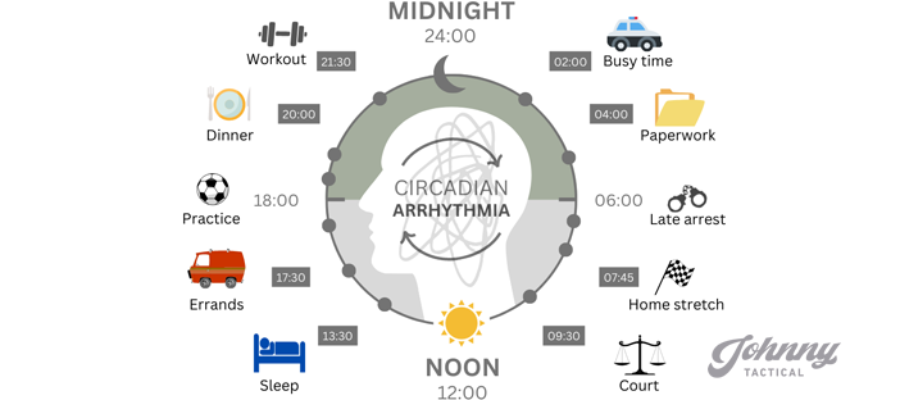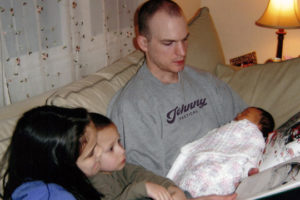Pardon me while I use big words in the blog title in a shameless effort to sound intelligent and grab your attention by making you think, “Man this guy must know what he’s talking about because, A) he’s on the internet, and B) he used big words that sound slightly familiar so I must read on to satisfy my curiosity and to also not appear less intelligent.”
And to that I say, Mission accomplished.
Sleep Is My Hobby
But don’t worry, you haven’t been bamboozled. The truth is I’m not that smart and reading this blog will cost you zero dollars. The information and ideas you are about to read that will improve your sleep come from #science and are totally safe. No drugs, no gadgets, just some pretty simple concepts you can understand and ideas you can try.
After years of working the midnight shift in Patrol, being on call 24/7 in SWAT and Detectives, and struggling through the most heinous of irregular schedules and sleep patterns for almost two decades, it has become somewhat of a hobby of mine to read or listen to anything I come across about getting better sleep.
Regular Tired vs. Midnight Tired
Let’s be honest, there’s “regular tired” and there’s “midnight tired.” Regular tired is when you’re the kind of person who works during the day and sleeps at night, but you didn’t get a good night’s rest so you yawn and feel sleepy as you go about your day. Waaaaa.
Midnight tired is when you sleep during the day and work at night, but because you had afternoon court you got two hours of on-and-off crappy sleep while your neighbor gratuitously ran his leaf blower outside your window. After court you came home, had to get the kids from school, walk the dog, eat dinner with the family, put the kids to bed, then try and take an hour nap before your shift at 11 p.m. — and do that for weeks on end but never in the same order. Midnight tired is basically living the life of a zombie, praying for death, but it never comes. Your head feels like you’ve been hung upside-down for an hour and then spun around and your stomach feels upset like the time you rolled the dice on that Chinese take-out you found in the back of the fridge. That is midnight tired in a nutshell.
Circadian Arrhythmia
This is a term I completely made up — at least as far as I know — so don’t get too hung up on it and send me hate mail. You’re probably familiar with circadian rhythm, well it’s just a play on that. The word circadian refers to 24-hour periods or cycles of biological activity, light and darkness, while arrhythmia is just a lack of rhythm, like me trying to dance or run in a three-legged race over hot coals. Mash those two terms together and you get the life of a police officer, minus the dance party. It’s irregular schedules and terrible sleep. No two weeks are the same, there’s almost always a curveball, and we can never seem to get in any sort of sleep routine. There’s no rhyme, reason, or rhythm to our 24 hour cycles — sleep or otherwise.
So what do we do about it? Well, apart from changing careers, we must first understand that this is the nature of the beast. Crime doesn’t sleep so neither can we, apparently. Then, realize we can only change the things that are within our power to do so. Namely, ourselves, our systems, or our tools.
Tools For Understanding Sleep
I came across this guy named Dr. Andrew Huberman who covers a number of topics on his podcast. He had a couple of episodes about getting better sleep so I tuned in and wanted to pass some ideas onto all of us who struggle with sleep, especially because of shift work. Here are some things we can do to fight fatigue and better our sleep that I have culled from the Dr. Andrew Huberman Podcast. Hopefully this will help you get a better understanding of how these things affect your sleep and then it’s up to you to try one, none, or all of them:
1. Light
Get exposed to sunlight, specifically, into your eyes where the body’s receptors are located that trigger your internal clock. Sunrise and sunset are the most important times to get that sunlight because it starts your body’s time of when to sleep and when to wake up. If you’re on the midnight shift your cycle will be inverted from the rest of the world who work during the day. That means sunset is your sunrise and sunrise is your sunset. It’s important to try and get both periods of sunlight into your eyes.
2. Darkness
Darkness triggers the body to release melatonin, which you need to sleep. Avoid light as much as possible leading up to your bedtime and then block sunlight out of your bedroom. After hitting the sack, if you must turn on a light to use the bathroom or read or whatever, use red colored light. Limit screen time and other forms of artificial light before bed.
3. Temperature
Use cold water for waking and warm / hot water for sleeping. 1-3 minutes of cold water exposure will increase your core body temperature. If you don’t like cold water, brief exercise will also raise your body temperature. This will help you feel and be more awake and alert. Before going to sleep, take a really warm / hot, short shower or bath. The brief increase in external temperature will cause your body to cool itself to counter the change in external temperature.
Your sleeping environment should be cool to cold, just add blankets as necessary to be comfortable. If you get hot while sleeping you can stick a hand or a foot out to cool yourself, but if your room is warm there’s no way to cool down which will wake you up. In general, cool = sleep, warm = wake. Personally, I like sleeping in a cool room and, as a married man, it saves me money in the winter and when my wife complains I can tell her it’s science.
4. Exercise
Exercising delays your circadian clock and warms your core temperature. So avoid exercise in the hours leading up to bedtime. Conversely, if you need to be awake, working out will raise your body temperature and keep you awake. Working out before a midnight shift will help keep you alert. I could never work out after a midnight shift, I was always way too tired, and as it turns out, that was a good thing since I was usually heading to bed anyway. I did, however, work out before my shift and noticed feeling more awake for at least the first half of my shift.
5. Caffeine
Wait to consume caffeine until 90-120 minutes after waking to avoid a mid-shift crash. Don’t consume caffeine less than 10 hours before bed. I’m very strict on this rule.
6. Alcohol
Avoid alcohol. Alcohol may help you fall asleep but your sleep will be fitful and suboptimal. I don’t drink so I’ll have to take his word on the science of alcohol and its effects on sleep.
7. Supplements
Three supplements he recommends are magnesium threonate, apigenin, and theanine. I’ve never used any of these, so I can’t give you my experience. I do use magnesium citrate pretty regularly and have found it helps me sleep but gives me weird, vivid dreams.
Use Your Noodle
As with anything that could affect your health, consult a doctor or other medical professional before trying something new. That way, you can blame them and not me. Plus they likely have way more money than me so that would be the person you’ll want to sue.
This blog is just a summary, so if you’re interested in Dr. Huberman’s full episodes and want more of the details you can click the links and have a listen for yourself:
Conquering Jet Lag and Shift Work
__________________________
Thanks for reading! Do you have a story that you think we could learn from and that you’d like to share with Johnny Tactical nation? Fill out the contact form and include your name, rank, and department, or email it to [email protected] and follow these guidelines:
– It must be a firsthand account
– True
– Have a lesson, principle, or tactic to apply
– Cleaned of names, dates, and places
– Include your call sign
If your story is selected and published in our blog you’ll get the credit using your call sign and we’ll send you a free Live Tactical t-shirt!




Leave a Reply
Your email is safe with us.
You must be logged in to post a comment.